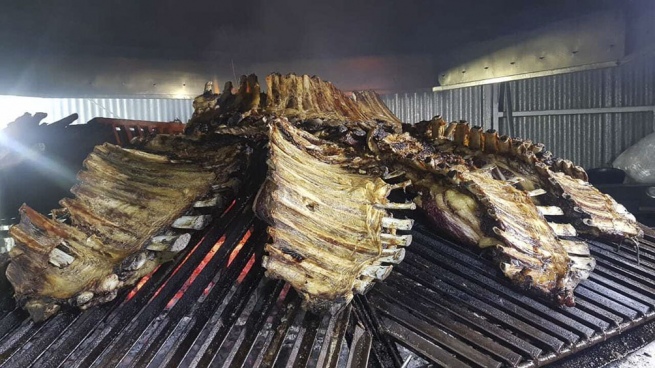The Ministry of Agriculture, Livestock and Fisheries ordered the suspension until the end of 2023 of the exports of seven barbecue cuts for domestic consumption, and at the same time released the shipment of meat from type D, E and bull cows, also called canned or manufactured.
The portfolio of Julian Dominguez Thus, he formalized a package of measures that aims to establish “a regulatory framework for the commercialization and export of livestock” for 2022 and 2023.
These provisions, agreed with the producer entities and the meat processing industry, will seek to give predictability and confidence to the sector, guaranteeing production, export and consumption, as highlighted.
They had been announced by Domínguez in December in the framework of the presentation of the GanAr livestock plan, which also includes the creation of credit lines to boost production at a subsidized rate of $ 100,000.
Decree 911/2021, published this Monday in the Official Gazette, established the suspension until December 31, 2023 of seven mass consumption cuts, reserving them for the local market: the roast with or without bone, skirt, matambre, roast cover, buttock, shoulder and vacuum.
Similarly, the export of whole cattle, half cattle, forequarters with bone, hindquarters with bone, incomplete half cattle with bone and incomplete forequarters with bone, is suspended.
The measure, according to the decree, seeks to “contribute to generating a balance between the Argentine market and the export of meat products”And seeks to promote“ value added ”in the chain within the country, promoting production and employment.
They are exempted from the restrictions on tariff quotas granted by third countries, such as the Hilton quota or the export quota to the United States.
Likewise, the Ministry of Agriculture, Livestock and Fisheries also released, in its entirety, the export of meat from category D and E cows and bull, except for the seven preferred cuts mentioned; as well as in shipment of bones with meat resulting from the deposit, through resolution 301/21.
For this purpose, the registry of exporters will be opened for 60 days, who, in addition, must present their Sworn Declarations of Meat Export Operations (DJEC) for which a term of five business days is established for their approval.
They will create a Meat Observatory
Finally, within the scope of the Ministry of Agriculture, the Observatory of Beef Production, to which the representatives of the provinces, entities of the agricultural sector, the meat-processing industry, corral fattening, slaughterers, suppliers, exporting producers and the Institute for the Promotion of Argentine Beef (IPCVA) were invited to be formed. .
This advisory body will have the purpose of providing advice to increase productivity, grant predictability and confidence to the producer and generate an adequate business environment; At the same time, it will analyze the evolution of existing livestock, slaughter and exports, to propose public policies for the development of Argentine livestock and its value chain.
Finally, through joint resolution 10/21 of the Ministry of Agriculture, Livestock and Fisheries and the Ministry of Productive Development, it is determined that meats destined for domestic retail trade must leave the refrigerators in units of up to 32 kilos, establishing terms of up to 6 months to meet this requirement.
In this way, the ban on the sending of half cattle to butchers is formalized, forcing them to be divided into quarters, as announced last April, in order to make the marketing chain more efficient.
















